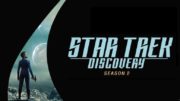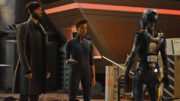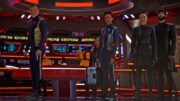Like last season, The Shuttle Pod has again transformed into Shuttle Pod At The Disco for the run of Star Trek: Discovery season two, with weekly podcasts about each new episode.
Shuttle Pod At The Disco – Season 2, Episode 9 – “Project Daedalus”
|
Subscribe to Shuttle Pod: The TrekMovie.com podcast on iTunes, Google Play Music, and Pocket Casts!
Like what you hear? Please leave us a review on iTunes.
Star Trek: Discovery Season 2, Episode 9
This week, Matt and returning guest host Laurie navigate through the minefield of “Project Daedalus.” There were lots of good character moments, and we loved finally learning about Airiam, but we weren’t so happy that this all just happened for the first time now. In a TV show that is supposed to be serialized, we’d have liked to have seen Airiam’s character growth sprinkled in all season long. Michael and Spock’s continued icy estranged sibling relationship was another highlight of the episode; Ethan Peck and Sonequa Martin-Green nailed it. There were also a few scenes that didn’t quite feel right, as if the script needed another pass or two to polish it up, but they were carried through by the consistently excellent performances of the cast.






By no means a flawless episode, but still easily among the best Discovery installments so far, and with the best, most heartfelt conclusion to a Trek story in what feels like ages. Kudos to the actors for some fine work, Jonathan Frakes for making a typically overstuffed story coherent and even cinematic — and, most of all, to Michelle Paradise, who took a very mixed bag of ingredients she had almost nothing to do with and wrote a script on her first outing that damn-near knocked it out of the park. I’ve disagreed with many of Kurtman’s decisions, God knows, but without a doubt I’d have made her showrunner myself.
I agree it’s frustrating to have this interesting looking character of Airiam on the bridge since the third episode and then suddenly getting this rush of actual characterization before her death.
It would be like if TNG had kept Data in the background until “The Measure of a Man” in the second season and then gave his backstory and asked us to care about his fate in that episode. The trial wouldn’t have had as much impact.
For me, that trial didn’t have any impact at all. Data was still nothing more than a walking version of the Enterprise main computer throughout the entire run of the show.
While I happen to agree with the notion that Airiam’s sacrifice might have meant more (and certainly been more shocking) had we gotten to know the character better earier on, it also seems to me a pretty weak excuse to belittle the episode as aired. Did the fact that we only got to see the Tomlinsons in one show make their fate, or that of Edith Keeler, any less moving? By those standards no audience could be expected to care about any character featured in a film that wasn’t a sequel, or who appeared on television prior to thr advent of modern serialized storytelling. So that sort of criticism strikes me as fairly shallow and reductive, more intent on snark than genuine insight, which is why I’ve regretfully put aside the podcast, at least for now.
I don’t think anyone is saying the episode itself lacks an emotional punch, but when a series is as heavily serialized as this one it seems jarring when so much ground is covered so quickly. Instead of paying off established relationships they seem to be taking shortcuts, which is something more in line with episodic television. Fine for one installment, but when taken in as a whole it comes across as a bit rudderless.
Yes, that’s basically what we we’re trying to say.
I’m actually fine with not knowing anything about Airiam prior to this episode.
When I try to imagine what establishing a relationship with her character would have looked like, I somehow picture the camera ominously following her around while heavy-percussion music telegraphs to the audience “All right, what is going through her head RIGHT NOW??” Like, I don’t think the show would have been able to resist it. And we’ve already had Season One of Battlestar Galactica for that.
It does bother me though that they should’ve been able to save her. And I don’t know why I didn’t think of that before playing this podcast. The transporters on ST really are a nuisance.
I have to say I’m surprised at this. And I hope there’s a dialog here, because I don’t think some of what you said is fair. We’re fans, and set out to discuss the show in that manner. Being a fan doesn’t mean you have to love every single thing about a show, and certainly we can see both the positives and negatives of an episode. We liked a lot of the individual components of the episode. And as always the cast did a great job.
That’s actually only one point we made, there are other issues that we discussed as well. I don’t feel like critiquing an episode along multiple facets is belittling it. We certainly didn’t set out to “insult” it, or whatever you might want to call it, which is implied in a word like belittle.
Clearly you liked the episode. We did too overall, many portions of the episode are quite good. But that doesn’t mean it’s without critique.
I’m not sure calling what we said “reductive” is really fair, in what way did we reduce or underplay the variety of issues with the script? We discussed various issues, not just Airiam. We outright discussed how there were ongoing shake ups behind the scenes. It’s not any one person’s fault. The Airiam backstory not being seeded throughout the season is simply one issue from all the turnover. And it’s an issue that’s germane to this episode given the focus on her.
Our intention was not be snarky. I think we got caught up chatting about the episode and repeated ourselves a bit too much, which certainly could have the unintended effect of appearing as if we’re hammering on the episode. As we say in the podcast — the episode had so much potential, and it was almost there, but needed more fine tuning, which in a way makes it even more painful, because you can see the greatness in there.
You have taken our comments to an extreme, we certainly did not say anything like that, nor do I think something like that could be inferred from what we said.
We even discussed some examples of how Trek has made it work in an episodic format, clearly, we felt it is indeed possible.
Also I’d point out that the examples we discussed in the podcast, and yours too, have a distinct difference from the case of Airiam. All of them involve guest characters, many of which were introduced in the same episode. Airiam has been a part of the bridge crew since we first saw the USS Discovery in episode three of season one.
I think there are different expectations for a recurring character, and especially one in a show that touts itself as being heavily serialized.
A counter-point to the lack of development for Airiam is Culber. Culber’s character has been serviced in both small and large moments since he returned to our universe in episode 205. Airiam has had little to no personality, and was never seen off duty, until the episode of her death. They had to do most of it in flashbacks instead of integrating it into the action. She was a character who fascinated people from her first appearance. So it’s a shame.
A good example, that just occurred to me as I was writing this, from the episodic era of Trek is the character of Reg Barclay. He started to get used more and more by the writers, and we got to know him better throughout TNG and even a bit of VOY, both of which were episodic shows but did a fine job working him in.
I’m with you on the science consultant thing, guys. It is so basic a thing…
They need a science advisor and a Star Trek advisor. Little things such as, why not use phasers to take out the mines? Why not use a transporter to beam Ariam out? Then just add a little dialogue to explain why they can or can’t do those things. Again, it comes down to writing. The biggest problem Discovery has had is poor writing. Not the acting, not the special effects.
I understand that the writers and producers probably want to avoid fan sites. Let’s face it, Star Trek fans can be a wee bit unhinged and possessive of their franchise. But if you can look at the valid critiques of the show and make the corrections , baby you could knock this series out of the park.
One of the risks of moving to the writers’ room model, is that they’ve lost the challenge function (other than the showrunners).
The idea is that the challenge happens in the writers’ room, but there can be group dynamics that can shut it down…especially after a period of a toxic relationship with the showrunners.
The model TNG followed with preproduction assistants triaging spec or contract scripts, lead writers revising/reworking scripts to ensure they were ‘Trek’, and a staff science consultant, had its own weaknesses, but it provided a kind of safety net.
But this model evolved away as DS9 was a serial.
Arguably, one of the reasons Voyager seemed to struggle for new ideas at times was because the spec script model had been abandoned.
Something to keep in mind when fans advocate for an episodic series.
But for Discovery, the idea of some science and Trek-type reviewers from outside the writers’ room might be money well spent to strengthen the product.
Last note, perhaps the Trekmovie staff have Intel on this, but from Kurtzman’s remarks, it sounds as though someone is scanning the fan sites for comments and views that resonate with large number of posters.
Could be a social media monitoring service or a staff assistant.
Justin, I think they could use a Star Trek advisor more than a science one. But then, I think they would be more bothered by someone reminding them of the rules and history of Trek more than science realities.
Compound that with the fact that there are so many people with the science knowledge and expertise that would do it for cheap or free! It’s like the show-makers are on an ego-trip by not consulting with a science expert. Didn’t Gene Roddenberry consult often with NASA and professors in the early seasons of TOS?
BTW: I teach physics and astrophysics and am available!
Yep, in TOS Roddenberry retained Kellam de Forest and his research company for the series (whose name always amuses me, since it’s like the inverse of DeForest Kelly).
https://memory-alpha.fandom.com/wiki/Kellam_de_Forest
And used Harvey P. Lynn, a physicist from the Rand Corp while writing the
The Cage.”
https://memory-alpha.fandom.com/wiki/Harvey_P._Lynn
For TMP, Roddenberry consulted with well known NASA rocket scientist Jesco von Puttkamer.
https://memory-alpha.fandom.com/wiki/Jesco_von_Puttkamer
Thanks, Matt. I remember reading about that in the Steven Whitfield book. But then the questions remains: why do the current Star Trek producers NOT consult with research companies and the like? It seems this anti-consultant method started with the 2009 Trek.
Roddenberry had the right idea to check his ego and make sure his stories followed scientific accuracy as much as possible.
I remember when Mr. Roddenberry came to Kennedy Space Center and was a guest of NASA. He wore these big bell bottoms…I liked him at that instant….lol
For me, it is the subsequent viewings where for the good episodes I start seeing the flaws. If the episode is good and I am wrapped into the story I tend to not notice plot holes or other flaws. If the episode is not working, I see those flaws right away as I start thinking about such things. I did not break down the flaws at the end because I was too engrossed in what was going on on screen. Overall, this was a pretty darn good episode for me. But yes, it could have been better had some things been done earlier. That said, the one thing I did think about briefly was the concept that if Ariem was aware something was amiss to the point where she tells Tilly to stay, why not ask to run some sort of diagnostic? And I briefly thought about Nahn seeing something weird and doing nothing. But again, I was so invested in the story that such things did not seem as egregious.
Weird that I seem to be in the minority that didn’t think the Spock-Stammets stuff was weird. Didn’t feel out of place for me at all.
The Spock-Michael stuff was OK but my problem is that it’s a relationship I really don’t care much about. So that scene I found more dismissive than than the Spock-Stammets scene.
I was not a huge fan of Spock SAYING he enjoyed expressing emotion. It really felt weird and totally out of place for Spock. Even considering where he is in life and what he is going through. None of that really makes sense to me.
I find it a little disingenuous to say that something feels forced in the episodes when I find the entire Spock-Burnham thing to be amazingly forced to begin with.
The part where I really started thinking about something else was, unsurprisingly, the Section 31 stuff. The mines I was wondering what was keeping the ship from just phasering them? And why did Section 31 have such a weird HQ and even had an HQ to begin with?
And the idea that S31 goes from underground to public to underground again I do find weird. But then, I’m not a fan of Section 31 to begin with. Would much rather they just have some black opps part of Federation Intelligence. But I guess that’s just me.
Regarding the “we can kill anyone” thing… Because they brought Culber back it sorta blows all that stuff out the window. Anyone can come back for ANY silly reason now. So I fully expect anyone to come back. Which, is what really undermined the drama of Ariem’s death, to be perfectly honest.
I was not happy with the lie detector being 100% accurate, myself. Making it “nearly” flawless would have been fine for me. The only way to be 100% is if you put some mind reader in there.
Regarding the swearing… Pike’s “Shitstorm” did NOT feel out of character or wrong. Tilly’s first season “F” bomb DID feel out of place and weird and amazingly wrong. And I am not someone who is bothered by swearing. Also, I did think the same thing when the admiral told Pike he was the best. The rest of the crew was not with Pike! That felt weird to say in front of them, yes.
Bottom line, yes, the impact could have been better but it still worked pretty well as it was.
I agree with Pike’s “Shitstorm” comment. I think that it was a matter of frustration that was building in Pike since the war. But Cornwall should have explained it to Pike in private. That way it doesn’t make the rest of the bridge crew feel like cannon fodder and the crew could also think she was reprimanding him about respecting the chain of command. At the same time it would reassure Pike that he is a valued captain.
Now see how hard is that? I’m an idiot and I could write a better scene than what is being put on screen. Step up writers!
I’ve been listening to your podcast for a few months now and generally I find your conversations enjoyable, but increasingly you’ve been spending more and more time gripping about minutia instead of talking about the relevant content of the episode. Spending an hour plus on how tiny bits of canon are broken or can be fixed by a trivial sentence of dialog just doesn’t seem like time well spent to me. I would have enjoyed a larger discussion of the story, the character arcs, the revelations, etc.
I’ve been listening to your podcast for a few months now and generally I find your conversations enjoyable, but increasingly you’ve been spending more and more time gripping about minutia instead of talking about the relevant content of the episode.
Thanks for the feedback. I think the issue is that a number of the early season episodes have been flawed, so we end up discussing the issues with it. The writing quality has waxed and waned, but the season as a whole is generally good, and seems to generally be on an upward swing for this second half of the season. I think “The Red Angel” will be an exciting episode, and hopefully the next podcast is more to your liking.
Spending an hour plus on how tiny bits of canon are broken or can be fixed by a trivial sentence of dialog just doesn’t seem like time well spent to me.
Actually we didn’t really focus on canon, we’re not hugely tied to canon when it makes sense to expand or change things. This episode got into discussing the writing and problems around lack of thinking through character motivations and using the Trek canvas in a way that makes sense. If we had issues with an episode we don’t want to just ignore them. That being said, Laurie and I realized we spent too long on certain things, and felt the end product wasn’t the best it could have been. So please bear with us :-)
I have to apologize for some of my own repetition for sure. I have such love for this show and its characters that it bothered me to see an episode that didn’t live up to its own potential. All the ingredients were there, but they didn’t come together for me, and once I expressed that, I (unfortunately) kept going. But for me, it wasn’t about fixing canon or trivial things, it was about watching stories and moments that weren’t thought through all the way. To me, it affected ALL the relevant content of the episode; it was irrevocably intertwined.
Thanks for your replies. They are appreciated and I’m glad you take the critique in the spirit that it was given in. I appreciate listing to intelligent people discuss Trek with some historical background of all the shows. I look forward to listening to your reactions to The Red Angel.
Nitpick: hard disagree with you guys about the need for Airiam to ask Nhan about the breathing apparatus. Not everybody remembers Barzaans and “The Price” so that was very necessary for viewers not familiar with TNG. My fiance asked about the mouthpiece when Nhan first appeared.
I think you mistinterpreted the writers’ intentions here. They weren’t trying to surprises the audience by having Airiam rip out the breathing apparatus, but rather to create tension. They’ve made it clear for a couple of episodes now that Airiam is compromised with the ominous 3 red lights in her eyes. Again, for tension building, not to surprise the audience. We the audience knew it was a matter of WHEN Airiam would turn against the crew, not IF.
Nice discussion overall, but I liked this episode a lot more than you guys it seemed. Yes, it would’ve been better if they had more development for Airiam throughout the series. However, in a way I think the writers deserve a ton of kudos for giving us so much intriguing background into Airiam and making us really feel her death in such a short amount of time.
I did get the intention, I just think they could have been clever about it. Instead of having Airiam ask Nhan if she needed her apparatus to breathe (which Airiam would already know), they could have talked about how they are both different from the others (since they are both augmented in their own way), or Airiam could have asked Nhan what her planet is like and then Nhan would have brought it up naturally. It’s the same issue across the board for me, they just went for the bare bones of everything instead of taking it to the next level as they usually do. It’s as if in the mess hall fight scene from the week before, Tyler had said, “I am like you because I am part Voq and part Tyler and it confuses me, and you are part Culber and part new being and that confuses you!” Instead, they got it done in two very well-written lines of dialogue that were much more powerful, said when stopped almost in mid-fight, face-to-face, in a very intense and effective moment. That’s all.
Another nitpick: you cite Spock saying “there are always possibilities” later in his life in your argument for why “nobody elese” besides Burnham seems to understand how the value of life is dealt with on Star Trek. However, Spock almost always advocated for violence or death when it was necessary. E.g., Gary Mitchell, Edith Keeler, attacking the Romulans in Balance of Terror, etc. Violence is sometimes necessary and logical.
Regarding Spock’s saying of “There are always Possibilities”. I do not recall him saying that all that much. I first heard it attributed to him in WoK. What I do recall is something similar from The Galileo Seven when he said they must consider alternatives. Mr. Bommer asked, “What alternatives are those?” “Mr Bommer, there are always alternatives.”